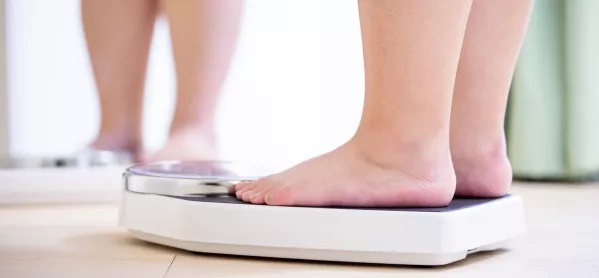The National Obesity Forum has suggested that children should be weighed in September, and again in spring, to ensure they lose any weight they’ve put on during lockdown.
My first response is: would we do this to adults? Adults are just grown-up children: we feel the same things, and experience the same issues.
I’ve definitely put on about a stone over lockdown. Imagine someone decreeing that I should be weighed at my workplace. It would be deemed completely inappropriate.
I think we need to think about the things that we inflict on children that we would never, ever tolerate as adults.
The number-one health crisis
Obviously, we have a duty to take care of children, and to look after them and keep them safe. And equally obviously, that includes keeping them healthy.
But the number-one health crisis for our children at any time is around their mental health. Post-lockdown, it’s clear that prioritising children’s mental health is absolutely vital. Wouldn’t it be awful if we did something to children, aiming to improve their physical health, and actually ended up having a negative impact on their mental health?
The average age of onset of anorexia nervosa is 16 years old. Rates of eating disorders in children under 12 are growing. These are the very children we could be putting through a weighing programme that could do them great harm. The causes of eating disorders are complex, but we know that psychological and environmental factors - such as criticism of eating habits or body shape - can have an effect.
We know that anxiety is running high among young people at the moment. There’s less socialisation, less routine and less control: they don’t know what’s going to happen in their future. All of these are contributing factors to anxiety, which can also trigger those struggling with an eating disorder.
So I’m not really sure what weighing children would achieve that would be particularly positive.
‘It’s good for you’
This also links with a lot of things we do to children around behaviour: we do things to children that we would never tolerate ourselves as adults.
There are school rules that, as a society, as adults, we would never accept. But we think it’s OK to do those things to children, under the guise of “It’s good for you”. I’m not talking about extremes of behaviour - I’m talking about children being punished for things that are actually just mistakes. Think of some of the zero-tolerance measures being applied to children who’ve forgotten their homework or their pencil.
These rules treat children like automatons - as though they don’t have feelings. And they’re very shame-based, or can be. Weighing children will involve shaming them into trying to lose weight. And most research tells us that shame is not a good motivator for behaviour change.
There’s an assumption that, if you just try harder, you can do it. But the reality isn’t that simple: there are issues of poverty that affect what you eat. So, by shaming the child, you’re shaming - albeit inadvertently - the parent for their own poverty. Instead, we should be looking at all the support for parents that’s no longer available - Sure Start, for example.
I think the government has a part to play here. If they eased up on some of the expectations on the curriculum and testing for a while, schools could focus much more on physical activity. Teachers could take children out into nature more. If we looked at improving physical and mental health together, this could make a real difference - much more so than weighing children.
What schools need right now isn’t another diktat, something else to do. What they need is freedom from some of the burdens they currently have, and permission to say: “Let’s get outside. Let’s be active.” I think most schools would welcome that. And it would be much more beneficial than just taking children into a room and weighing them.
Kym Scott worked for the London borough of Lewisham for 15 years as a school improvement adviser for early years. She is an author, consultant and founder member of the Keep Early Years Unique campaign

